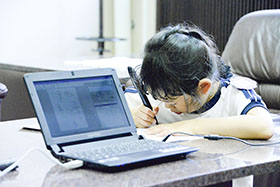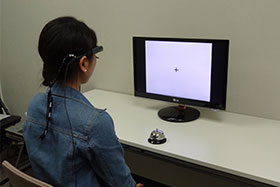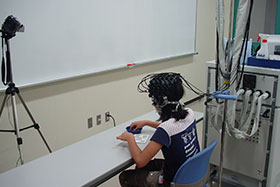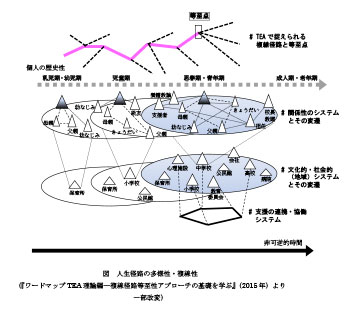 Recently, the environment of childcare has changed greatly owing to the declining birthrate, aging population, and increased women’s participation in society and nuclear families. The stress and burden of childcare, especially for mothers, is an important issue. Additionally, in late childbirths, the anxiety about pregnancy and delivery tends to be higher. Given the changes that occurred in children’s environment, their development of sociability, including self-control and cooperativeness, is also considered an issue requiring more attention.
Recently, the environment of childcare has changed greatly owing to the declining birthrate, aging population, and increased women’s participation in society and nuclear families. The stress and burden of childcare, especially for mothers, is an important issue. Additionally, in late childbirths, the anxiety about pregnancy and delivery tends to be higher. Given the changes that occurred in children’s environment, their development of sociability, including self-control and cooperativeness, is also considered an issue requiring more attention.
Our research group conducts a long-term longitudinal study aiming to clarify the influence of social and physical environmental factors on parenting and children’s development, and develop and implement a childcare support system that can promote early detection and intervention for problems in the parent-child interaction, through the conduction of successive investigations with children (ranging from infants to preschoolers) and their parents.
Our research has significant academic meaning as it involves transdisciplinary developmental research with quantitative and qualitative longitudinal data using multiple methods, such as behavior observation and assessment, questionnaires, interviews, and physiological indices. It also makes a great social contribution because of its proposal of childcare support based on scientific evidence.
The purpose of our research group is to examine appropriate ways of teaching by using physiological measurement techniques, such as brain activity measurement and eye tracking, and to evaluate the characteristics of learning and teaching mathematics at schools.
When appropriate teaching is examined from a pedagogical perspective, it is important to analyze the problem-solving process of the learner, teaching process of the teacher, and thinking processes of both. Therefore, many studies have used research methods such as misinformation analysis, questionnaire surveys, and protocol acquisition. However, because of the unconscious aspect of the processes involved and the fact that not everything can be memorized, those methods had difficulties in performing objective time-series analysis.
Thus, our research group examines optimal teaching strategies by combining physiological measurements, such as brain activity measurement and eye tracking, with conventional methods to visualize the time-series thinking process of learners and teachers using objective metrics.


 Our research group investigates career development and support for university students and young workers. By thinking about our “career,” that is, how we live, we can be better off in the future. Our research describes people’s diverse life trajectories, especially “how we live” and “how we work,” and contributes to improvements in our society. Our studies explore the best way to support people’s careers. Moreover, we have been developing a way to describe people’s life trajectories, called “Trajectory Equifinality Approach.”
Our research group investigates career development and support for university students and young workers. By thinking about our “career,” that is, how we live, we can be better off in the future. Our research describes people’s diverse life trajectories, especially “how we live” and “how we work,” and contributes to improvements in our society. Our studies explore the best way to support people’s careers. Moreover, we have been developing a way to describe people’s life trajectories, called “Trajectory Equifinality Approach.”
Out research group investigates quality of life in middle and old age, in particular, conducting surveys using “item self-determinant” quality of life (QOL) measurements, known as SEI-QOL* (Schedule for the Evaluation of Individual QOL), which is really challenging and innovative because QOL varies across individuals even within the same generation in a single culture. The results are used to develop counseling tools to understand individual QOL. Additionally, we are interested in improving QOL through health promotion in the elderly in Fukushima Prefecture, where we are promoting the health of residents in collaboration with the local government.
*SEI-QOL is an interview-based instrument for assessing an individual’s QOL.
Our research group aims to explore ways to provide better services to older adults and diverse communities, as Japan is facing a turning point where we need to embrace aging and diverse populations. Recently in Japan, the number of individuals over 65 years has hit the world record of over 34 million (Statistics Japan, 2016) and the number of foreign residents exceeds 2.3 million (Ministry of Justice, 2016). In the midst of such population changes, it is crucial to facilitate research that promotes both individual and community well-being.
Our group conducts neuro-cognitive research on motor inhibition function among aging adults, investigates acculturation and wellness among international students, and explores attitudes and identity development in majorities. Additionally, we conduct cross-cultural research with colleagues around the world on grief and emotion, with the hope to apply the results to clinical services and intercultural communications. Through these research activities, we aim to contribute to our surrounding communities and larger societies and train researchers to work effectively in international settings.